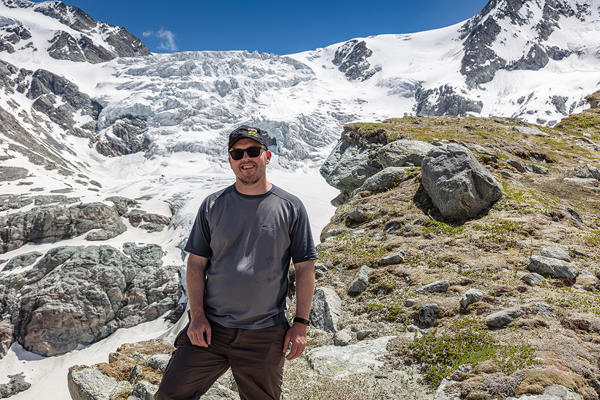Virtual Field Trips Bring Landscapes to Life
Thursday, 27 January 2022
A University of Worcester academic is leading an exciting new project exploring how virtual reality (VR) can be used to make fieldwork in the environmental sciences more inclusive.
 Dr Des McDougall, Principal Lecturer in Geography, on a field trip in Switzerland in 2019 - credit James Atkins
Dr Des McDougall, Principal Lecturer in Geography, on a field trip in Switzerland in 2019 - credit James Atkins
Dr Des McDougall, Principal Lecturer in Geography, is working on a 6-month scheme, which also involves Bangor and Salford universities, with funding from the Natural Environment Research Council (NERC). This work builds on the University of Worcester’s 15 years’ experience in virtual field trip development.
“This project will support staff in universities to use virtual fieldwork in ways that make real fieldwork more inclusive,” said Dr McDougall. “Fieldwork is a key approach in many environmental science subjects, such as geography, geology, and ecology, but it can be problematic for some students, including those with disabilities – both seen and unseen. Virtual fieldwork can be used to support the real thing, although it should be part of a broader approach to inclusion.”
Dr McDougall creates virtual field trips by taking 360-degree images at specific points across the landscape, which are then made available online. He said this provides a more immersive and interactive experience than is possible with textbooks, journal articles, and lectures, where the views presented in photographs are static and chosen by others. “It’s about trying to place the learner in the field and providing them with agency so that they can look wherever they want and navigate their way through the landscape,” he said.
There are multiple ways in which virtual fieldwork can support inclusion. For example, students with mobility issues and those with certain unseen disabilities can really benefit from being able to learn about the nature of the terrain and prepare for it in advance. For some other students, fieldwork is sometimes overwhelming, which in turn can get in the way of learning. The ability to revisit field sites can be hugely beneficial to these students. “The use of virtual fieldwork is all about supporting the real thing, not using it as a substitute. At Worcester, we have a long tradition of using virtual fieldwork in this way,” Dr McDougall added.
The new project involves compiling case studies that showcase the many benefits of virtual fieldwork, which extend beyond inclusive practice and can be of value to all students and staff. The project will also provide academics with a toolkit to help them create their own virtual field trips, as well as supporting these initiatives through an informal network of educators.
The University has been at the forefront of virtual fieldwork development since 2005. In 2018, Dr McDougall launched ‘VR Glaciers and Glaciated Landscapes’, a collection of free virtual field trips to Switzerland, California and the Lake District. Over 70,000 learners in schools, colleges and universities around the world have used these resources since the start of the pandemic. In addition, Dr McDougall has helped academics at other universities, such as Stanford and Ohio State, to develop their own virtual field trips. The ‘VR Glaciers and Glaciated Landscapes’ site has been generously supported by the School of Science and the Environment Learning and Teaching Fund, as well as grants from the Quaternary Research Association and the British Society for Geomorphology.
Find out more about the University’s work on the VR Glaciers and Glaciated Landscapes website.